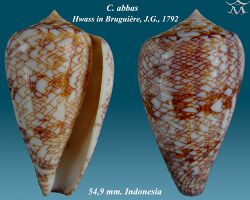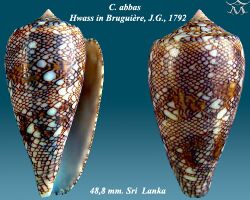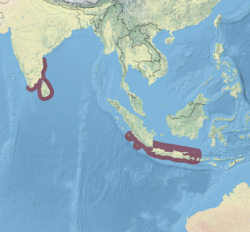Biology:Conus abbas
| Conus abbas | |
|---|---|

| |

| |
| Apertural and abapertural views of shell of Conus abbas | |
| Scientific classification | |
| Domain: | Eukaryota |
| Kingdom: | Animalia |
| Phylum: | Mollusca |
| Class: | Gastropoda |
| Subclass: | Caenogastropoda |
| Order: | Neogastropoda |
| Superfamily: | Conoidea |
| Family: | Conidae |
| Genus: | Conus |
| Species: | C. abbas
|
| Binomial name | |
| Conus abbas Hwass in Bruguière, 1792
| |
| Synonyms[2] | |
| |
Conus abbas, common name the abbas cone, is a species of sea snail, a marine gastropod mollusk in the family Conidae, the cone snails and their allies.[2]
Like all species within the genus Conus, these snails are predatory and venomous. They are capable of "stinging" humans, therefore live ones should be handled carefully.
Description
The shell of this species is white, very finely reticulated with narrow orange-brown lines, with a broad central and often narrower upper and lower bands of darker color bearing occasional longitudinal chocolate stripes.[3]
The height of the shell is from 1.5 inches (38 mm) to 2.5 inches (64 mm).[3]
The shell is very similar to that of Conus textile, but the shell is smaller, the reticulations much smaller, the longitudinal streaks rarely apparent, and the dark bands of Conus abbas occupy about the same positions as the lightest markings of Conus textile.[3]
Distribution
- Distribution after Tryon (1884): East Africa, Ceylon, Philippines, New Caledonia.[3]
- Distribution after Conus Biodiversity website: from South India and Sri Lanka to Java and Bali in Indonesia.[4]
- Madagascar [2]
Ecology
Like all species within the genus Conus, these snails are predatory and venomous. They are capable of "stinging" humans, therefore live ones should be handled carefully or not at all.
References
This article incorporates public domain text from the reference.[3]
- ↑ 1.0 1.1 Kohn A. (2013). "Conus abbas". The IUCN Red List of Threatened Species. Version 2014.2. <www.iucnredlist.org>. Downloaded on 04 August 2014.
- ↑ 2.0 2.1 2.2 Conus abbas Hwass in Bruguière, 1792. Retrieved through: World Register of Marine Species on 20 March 2010.
- ↑ 3.0 3.1 3.2 3.3 3.4 Tryon G. W. (1884). Manual of Conchology, structural and systematic, with illustrations of the species. Volume 6. Conidae, Pleurotomidae. page 92. Plate 30, figure 12-14.
- ↑ "Conus abbas Hwass in Bruguière, 1792.". The Conus Biodiversity website, accessed 21 March 2010.
- Dautzenberg, Ph. (1929). Mollusques testacés marins de Madagascar. Faune des Colonies Francaises, Tome III
- Filmer R.M. (2001). A Catalogue of Nomenclature and Taxonomy in the Living Conidae 1758 - 1998. Backhuys Publishers, Leiden. 388pp.
- Tucker J.K. (2009). Recent cone species database. September 4, 2009 Edition
- Tucker J.K. & Tenorio M.J. (2009) Systematic classification of Recent and fossil conoidean gastropods. Hackenheim: Conchbooks. 296 pp
- Puillandre N., Duda T.F., Meyer C., Olivera B.M. & Bouchet P. (2015). One, four or 100 genera? A new classification of the cone snails. Journal of Molluscan Studies. 81: 1-23
External links
- The Conus Biodiversity website
- Cone Shells - Knights of the Sea
- "Pionoconus aurisiacus" (in en). Gastropods.com. http://www.gastropods.com/3/Shell_583.shtml.
Wikidata ☰ Q2726506 entry
 |



